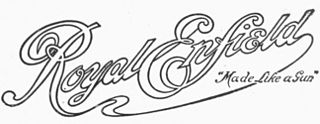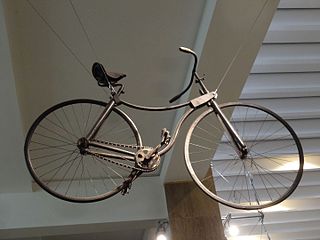Related Research Articles

The Birmingham Small Arms Company Limited (BSA) was a major British industrial combine, a group of businesses manufacturing military and sporting firearms; bicycles; motorcycles; cars; buses and bodies; steel; iron castings; hand, power, and machine tools; coal cleaning and handling plants; sintered metals; and hard chrome process.

Moulton is an English bicycle manufacturer based in Bradford-on-Avon, Wiltshire. The company was founded in 1962 by Alex Moulton (1920–2012) who had designed the "Hydrolastic" and rubber cone suspension systems for the BMC Mini motorcar. Moulton bicycles are noted for unconventional frame design, small wheels, and front and rear suspension.

Pashley Cycles is a British bicycle, tricycle and workbike manufacturer based in Stratford-upon-Avon in Warwickshire, England. The company was started in 1926 and still manufactures bikes in the UK.

James Starley was an English inventor and father of the bicycle industry. He was one of the most innovative and successful builders of bicycles and tricycles. His inventions include the differential gear, the perfection of the bicycle chain drive, and the penny-farthing.

The Triumph Motor Company was a British car and motor manufacturing company in the 19th and 20th centuries. The marque had its origins in 1885 when Siegfried Bettmann of Nuremberg formed S. Bettmann & Co. and started importing bicycles from Europe and selling them under his own trade name in London. The trade name became "Triumph" the following year, and in 1887 Bettmann was joined by a partner, Moritz Schulte, also from Germany. In 1889, the businessmen started producing their own bicycles in Coventry, England.

Royal Enfield was a brand name under which The Enfield Cycle Company Limited of Redditch, Worcestershire, England, sold motorcycles, bicycles, lawnmowers and stationary engines which it manufactured. Enfield Cycle Company also used the brand name "Enfield" without the "Royal". Later in 1994, Eicher Motors an Indian multinational automobile manufacturing company took over the company's full ownership.

A safety bicycle is a type of bicycle that became very popular beginning in the late 1880s as an alternative to the penny-farthing and is now the most common type of bicycle. Early bicycles of this style were known as safety bicycles because they were noted for, and marketed as, being safer than the high wheelers they were replacing. Even though modern bicycles use a similar design, the term is rarely used today and is considered obsolete outside circles familiar with high wheelers.
The Calthorpe Motor Company based in Bordesley Green, Birmingham, England, made a range of cars, motorcycles and bicycles from 1904 to 1932.

Alexander Eric Moulton was an English engineer and inventor, specialising in suspension design.

Coventry Premier Limited owned a British car and cyclecar manufacturing business based in Coventry from 1912 to 1923. It changed its name from Premier Cycles to Coventry Premier Ltd in November 1914.

The James Cycle Co Ltd., Greet, Birmingham, England, was one of many British cycle and motorcycle makers based in the English Midlands, particularly Birmingham. Most of their light motorcycles, often with the characteristic maroon finish, used Villiers and, later, AMC two-stroke engines.
Rubery Owen is a British engineering company which was founded in 1884 in Darlaston, West Midlands.

Ariel Motorcycles was a British maker of bicycles and then motorcycles in Bournbrook, Birmingham. It was an innovator in British motorcycling, part of the Ariel marque. The company was sold to BSA in 1951 but the brand survived until 1967. Influential Ariel designers included Val Page and Edward Turner. The last motorcycle-type vehicle to carry the Ariel name was a short-lived three-wheel tilting moped in 1970.
The Raleigh Bicycle Company is a British bicycle manufacturer based in Nottingham, England and founded by Woodhead and Angois in 1885. Using Raleigh as their brand name, it is one of the oldest bicycle companies in the world. After being acquired by Frank Bowden in December 1888, it became The Raleigh Cycle Company, which was registered as a limited liability company in January 1889. By 1913, it was the largest bicycle manufacturing company in the world. From 1921 to 1935, Raleigh also produced motorcycles and three-wheel cars, leading to the formation of Reliant Motors. Raleigh bicycle is now a division of the Dutch corporation Accell.
The sheriff is the oldest secular office under the Crown. Formerly the sheriff was the principal law enforcement officer in the county but over the centuries most of the responsibilities associated with the post have been transferred elsewhere or are now defunct so that its functions are now largely ceremonial. The sheriff changes every April.
Sir John Throgmorton Middlemore, 1st Baronet was an English Liberal Unionist politician who served as Member of Parliament (MP) for Birmingham North.

Thomas Middlemore was an English mountaineer who made multiple first ascents during the silver age of alpinism. His audacity earned him a reputation as the enfant terrible within the Alpine Club. He was also the head of the Middlemores Saddles leather goods company in Birmingham, England, after the retirement of his father, William Middlemore, in 1881. Thomas Middlemore had taken over the management of the company in 1868 and established a bicycle saddle factory in Coventry.
Middlemore is a southern suburb of Auckland, New Zealand.

BSA motorcycles were made by the Birmingham Small Arms Company Limited (BSA), which was a major British industrial combine, a group of businesses manufacturing military and sporting firearms; bicycles; motorcycles; cars; buses and bodies; steel; iron castings; hand, power, and machine tools; coal cleaning and handling plants; sintered metals; and hard chrome process.

William Scully Ltd. is a Canadian uniform accoutrements manufacturer based in Montreal, QC, Canada, founded in 1877 by William Scully, a British manufacturers’ Canadian Representative, in Toronto. He was the first Canadian representative of London's Welsh Margetson and Sons. The company remains a family owned and operated firm after five generations.
References
- 1 2 "Remember when . . . ?". The Free Library . Farlex Inc. / Coventry Newspapers. 2003.
- 1 2 "London Gazette" (PDF). 1832. p. 658.[ dead link ], 20 March, gave notice of the 31 December 1831 dissolving of Richard, William and James' partnership
- 1 2 G. T. Vickery (11 June 1991). "Middlemores (Coventry) Limited" (pdf). London Gazette . p. 8978.
- ↑ Middlemore family grave of brothers William, Richard, James showing birth and death dates "Flickr". 17 June 2010.
- ↑ "London Gazette" (PDF). 1841. p. 1866. July 14, notice of William and James partnership dissolved on June 30
- ↑ "Plarr's Lives Of The Fellows Online: Biographical entry for Middlemore, Richard (1804 - 1891)". The Royal College of Surgeons of England. 15 August 2012.
- ↑ Whitakers Peerage, Baronetage, Knightage, And Companionage For The Year... 1925. p. 424. Sir William 2nd Baronet, son of 1st Baronet
- ↑ The Mercury. 6 October 1934. Hobart Tasmania, 6 October 1934, page 7 on Sir William's wedding, mentions him inheriting title from Sir John
- ↑ Betteridge, Alan (2010). Deep Roots, Living Branches: A History Of Baptists In The English Western Midlands. Troubador Publishing. p. 240. ISBN 978-1-84876-277-0.
- ↑ "London Gazette" (PDF). 1882. p. 3425.[ dead link ], 1 May, notice of partnership with Thomas dissolved, 31 December 1881, due to William's retirement
- ↑ Tinniswood, Adrian (1999). The Arts & Crafts House. New York: Watson-Guptill Publications. p. 34. ISBN 0-8230-0364-7.
- ↑ Historic Environment Scotland. "Walls (Hoy), Melsetter, the Hall, including Gatepiers to West (Category B Listed Building) (LB48367)" . Retrieved 28 March 2019.
- ↑ Archibald Sharp (1896). Bicycles & Tricycles: A Classic Treatise On Their Design And Construction. Courier Corporation. p. 523. ISBN 9780486429878., fig. 560 shows a William Middlemore bicycle saddle
- ↑ The Stock Exchange Official Intelligence Volume 20. Spottiswoode, Ballantyne & Company, Limited. 1902. p. 905.
- ↑ "Historic Coventry". Website with a photo from c1896 Showing the premises was established as Wm Middlemore Cycle Saddlery Works before the merger with Lamplugh and Co.
- ↑ National Harness Review. 1919. vols. 81-82, 1919, page 10
- ↑ "London Gazette" (PDF). 1920. p. 5637., 18 May, notice of upcoming meeting on 4 June 1920 concerning liquidation
- ↑ "Graces Guide".Middlemores page, newspaper adverts
- ↑ "Flickr". 24 February 2012. B3 sidestamp
- ↑ "Flickr". 30 October 2012. B89 rear badge
- ↑ Espacenet. B89N nosepiece patent
- ↑ Flickr. 5 September 2012. B89N nosepiece with patent number
- ↑ "Flickr". 16 December 2010.M89 saddletop stamp
- ↑ "Flickr". 16 December 2010.M89, Moulton rear badge